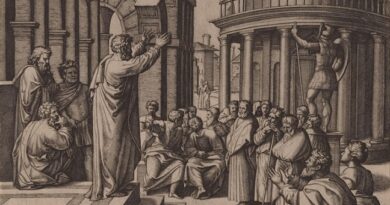A Study on the Hebrew Concepts of Soul and Eternal Punishment
- Does the Bible say that a person has a soul or is a soul?
Genesis 2:7 (KJV), And the LORD God formed man of the dust of the ground and breathed into his nostrils the breath of life; and man became a living soul. [(RSV), …and man became a living being.][1]
Comment: Concerning the Hebrew word VINE’S COMPLETE EXPOSITORY DICTIONARY Of OLD And NEW TESTAMENT WORDS says, “[Soul] is an unfortunate mistranslation of the term…. The problem with the English term soul is that no actual equivalent of the term or the idea behind it is represented in the Hebrew language. The Hebrew system of thought does not include the combination or opposition of the terms body and soul, which are really Greek and Latin in origin.” In agreement with this, J. Philip Hyatt writes in his book, THE HERITAGE Of The BIBLICAL FAITH, pg. 104, “The Hebrew word here translated soul …does not mean soul in the sense in which we ordinarily understand that term today, as the spiritual or invisible part of man. [The Hebrew term] means the total self, the person, man as a whole. [It] is not what one has as a part of himself, but what he is as a totality. Man is thus an animated body, not an incarnated soul. The latter is characteristic of the Greeks, who believed that man is composed of an immortal, pure soul housed in a mortal, corrupt body.”
- It is commonly believed that the soul is immortal. The Greek word forimmortal simply means deathless. Does the Bible say that the soul is deathless.
Ezekiel 18:4, 20, Behold, all souls are mine; …the soul that sins, it shall die. / The soul that sins shall die….
Psalm 78:50 (KJV), He made a way to his anger; he spared not their soul from death, but gave their life over to the pestilence
James 5:20, let him know that whoever brings back a sinner from the error of his way will save his soul from death and will cover a multitude of sins.
- Of what is the mortal soul composed?
Genesis 2:7 (KJV); 3:19, And the LORD God formed man of the dust of the ground, and breathed into his nostrils the breath of life; and man became a living soul.[2] / In the sweat of your face you shall eat bread til you return to the ground, for out of it you were taken; you are dust, and to dust you shall return.”
Psalm 103:14, For [Yahweh] knows our frame; he remembers that we are dust.
- Is the soul the same thing as the spirit?
Hebrews 4:12, For the word of God is living and active, sharper than any two-edged sword, piercing to the division of soul and spirit, of joints and marrow, and discerning the thoughts and intentions of the heart.
Comment: Notice here that the soul and the spirit can be divided or separated. The original language terms for spirit can also be rendered as wind or breath. The basic idea is an invisible power or force.
- Does the Bible use the term soul in reference to animals?
Numbers 31:28 (KJV), …one soul of five hundred, both of the persons, and of the beeves, and of the asses, and of the sheep
Comment: The Hebrew word for soul occurs in other verses when referring to animals but is translated differently into English. The KJV and RSV use the word creature to translate the same Hebrew word in Genesis 1:20, 21, 24.
- Does the Bible show that animals have spirit or the breath of life?
Genesis 7:21, 22, And all flesh died that moved upon the earth, birds, cattle, beasts, all swarming creatures that swarm upon the earth, and every man; everything on the dry land in whose nostrils was the breath of life died.
Ecclesiastes 3:19-21, For the fate of the sons of men and the fate of beasts is the same; as one dies, so dies the other. They all have the same breath [Hebrew word used here is translated spirit in verse 21], and man has no advantage over the beasts; for all is vanity. All go to one place; all are from the dust, and all turn to dust again. Who knows whether the spirit [same Hebrew word that is translated breath above] of man goes upward and the spirit [or breath] of the beast goes down to the earth?
Comment: This last verse does not mean that people go to heaven at death, because verse 20 says that “all [humans and animals] go to one place” at death, the dust. Rather, it refers to the fact that humans have the hope of living again (resurrection), whereas animals do not.
- Does a person’s spirit maintain aconscious existence upon the death of the soul?
Ecclesiastes 9:4, 5, 10, But he who is joined with all the living has hope, for a living dog is better than a dead lion. For the living know that they will die, but the dead know nothing, and they have no more reward [refers to earthly wealth as a reward for their labors]; but the memory of them is lost. / Whatever your hand finds to do, do it with your might; for there is no work or thought or knowledge or wisdom in Sheol [the grave, (KJV)], to which you are going.
Psalm 6:5; 146:2-4, For in death there is no remembrance of thee [Yahweh]; in Sheol [the grave, (KJV)] who can give thee praise? / I will praise the LORD as long as I live; I will sing praises to my God while I have being. Put not your trust in princes, in a son of man, in whom there is no help. When his breath departs he returns to his earth; on that very day his plans [thoughts, (KJV)] perish.
Comment: From these verses we can see that people and animals are souls that become unconscious at death. Unlike animals, however, people have the prospect of resurrection to eternal life. This is the only hope set forth by the Bible for existence after death. See John 5:28, 29 and 1 Corinthians 15:16-19. The popular concept of immortal soul, a phrase which never occurs in the Bible, is actually derived from pagan religion.
By examining the Scriptural concept of soul (and thereby removing the taint of Greek paganism[3] ), we have discovered that the soul is inherently mortal and does not maintain a conscious existence after death. One might wonder, then, what is the eternal fate of the soul of an unrepentant sinner? This continuing examination will reveal the Biblical teaching on this subject.
- What was Adam told would be the punishment for disobedience?
Genesis 2:16, 17, And the LORD God commanded the man, saying, “You may freely eat of every tree of the garden; but of the tree of the knowledge of good and evil you shall not eat, for in the day that you eat of it you shall die.
- When Adam had actually disobeyed, to what punishment was he sentenced?
Genesis 3:17-19, And to Adam [Yahweh] said, “Because you have listened to the voice of your wife, and have eaten of the tree of which I commanded you, ‘You shall not eat of it,’ cursed is the ground because of you; in toil you shall eat of it all the days of your life; thorns and thistles it shall bring forth to you; and you shall eat the plants of the field. In the sweat of your face you shall eat bread till you return to the ground, for out of it you were taken; you are dust, and to dust you shall return.”
Comment: Note that the only suffering referred to here was the hardship Adam would endure while still alive. There is no mention of torment after death.
- As shown above death is the punishment for sin. Does the Christian Testament agree with this?
Romans 6:23, For the wages of sin is death,…
- What is the fate of the soul that sins?
James 5:20, let him know that whoever brings back a sinner from the error of his way will save his soul from death and will cover a multitude of sins.
Matthew 10:28, [Jesus said,] “And do not fear those who kill the body but cannot kill the soul; rather fear him who can destroy both soul and body in hell.”
Comment: As revealed in the first part of this study a dead soul is unconscious. Therefore, the wicked would have to be given eternal life to be tormented eternally. Yet, Romans 6:23, a portion of which is quoted above, continues, “…but the free gift of God is eternal life in Christ Jesus our Lord.” Only those who accept the Lordship of Jesus Christ receive the free gift of eternal life.
- Doesn’t the Bible speak of hell?
Psalm 16:10 (KJV), For thou wilt not leave my soul in hell (Heb., sheol); neither wilt thou suffer thine Holy One to see corruption.
Acts 2:27 (KJV), Because thou wilt not leave my soul in hell (Gk., hades), neither wilt thou suffer thine Holy One to see corruption.
Matthew 5:22 (KJV), [Jesus said,] “…but whosoever shall say, Thou fool, shall be in danger of hell (Gk., gehenna) fire..”
2 Peter 2:4 (KJV), For if God spared not the angels that sinned, but cast them down to hell (Gk., tartaroo), and delivered them into chains of darkness, to be reserved unto judgment
Comment: The Hebrew Scriptures were written in Hebrew and the Christian Testament in Greek. The KJV translates one Hebrew word, sheol, three different ways: as hell 31 times, as grave 31 times, and as pit 3 times. Conversely, the KJV translates 3 different Greek words with the one English word hell! The word tartaroo is a verb meaning cast into tartarus and occurs only once, and that in reference to angels that sinned. (2 Peter 2:4) Hades was the Greek word used to correspond to the Hebrew word sheol, concerning which the Encyclopedia Britannica (1971, Vol. 11, p. 276) noted, “The state of the dead was one of neither pain nor pleasure. Neither reward for the righteous nor punishment for the wicked was associated with Sheol. The good and the bad alike, tyrants and saints, kings and orphans, Israelites and gentiles — all slept together without awareness of one another.”[4] The word gehenna is the Greek form of the Hebrew place-name meaning Valley of Hinnom. In ancient times idolatrous worship and child sacrifice were performed in this valley. (2 Chron- icles 28:1, 3; 33:1, 6) In Jesus’ day it was used as a garbage dump, and fires were kept burning to destroy the refuse. The Jews considered a decent burial very important. Sometimes, the bodies of criminals considered unworthy of a decent funeral –hence, in the opinion of these Jews, unworthy of a resurrection– were thrown there.
With this information in view, is gehenna better regarded as a symbol of eternal torment or of eternal destruction? Isn’t it ironic that the place where the burning of child sacrifices which Yahweh considered so abominable is thought my many to be the symbol of eternal torment from Him? — Jeremiah 7:31,32; 32:35
- But doesn’t the Bible mention torment in references that seem to apply to eternal punishment?
Revelation 14:10-12; 20:10, he also shall drink the wine of God’s wrath, poured unmixed into the cup of his anger, and he shall be tormented with fire and sulphur in the presence of the holy angels and in the presence of the Lamb. And the smoke of their torment goes up for ever and ever; and they have no rest, day or night, these worshipers of the beast and its image, and whoever receives the mark of its name. Here is a call for the endurance of the saints, those who keep the commandments of God and the faith of Jesus. / and the devil who had deceived them was thrown into the lake of fire and sulphur where the beast and the false prophet were, and they will be tormented day and night for ever and ever.
Luke 16:23, 28, and in Hades, being in torment, [the rich man] lifted up his eyes, and saw Abraham far off and Lazarus in his bosom. / [The rich man said,] “for I have five brothers, so that he may warn them, lest they also come into this place of torment.”
Comment: Notice at Revelation 20:10 only the devil, the beast and the false prophet are mentioned as being tormented day and night for ever and ever, not mankind. Concerning those who, in this context, were misled by Satan, it says, “And fire came down from heaven, and consumed them.” (Revelation 20:9) Others, –including death and hades [hell, (KJV)]– are said to be in the lake of fire also, but there is no mention of torment for these. (Revelation 20:14, 15) How could death and hades be tormented? So if one should conclude that the torment of Revelation 20:10 is literal, it must apply only to the devil, beast, and false prophet. However, it is not necessarily literal torment. According to Vine’s Expository Dictionary the Greek word basanizo means secondarily, “to examine by torture,” hence, denotes “torture, torment, distress.” Primarily, it means “to rub on the touchstone, to put to the test.” Consequently, the events depicted in Revelation 20 set the divine-legal precedent; the issues raised by Satan’s rebellion have been tested, examined, proved unfounded, and disposed of without further appeal.
Revelation 14:10 speaks of people who are to be tormented, but notice verse 11 says that “the smoke of their torment goes up for ever and ever,” not that their torment lasts forever. If you see smoke in the distance you know that there is, or recently has been, a fire. Similarly, the smoke of the wicked’s torment, which culminates in their destruction, warns onlookers about the results of the path of rebellion. What about having “no rest day or night”? If we compare this to Revelation 11:7-10 we can see that this is not referring to the torment of destruction, but the torment caused by the preaching work performed by the saints. That is why Revelation 14:12 calls for the saints to have endurance, because of the persecution they will suffer at the hands of these wicked people about whose destruction they preach.
Torment is also mentioned by Jesus in the parable of the “Rich Man and Lazarus.” If this story were literal, as many assert, how reasonable would it be that a fingertip dipped in water would relieve the torment of the Rich Man?
Notice to whom Jesus directed this story. It was to the Pharisees who were described as being “lovers of money.” (v. 14, RSV; “covetous,” KJV) Similarly the Rich Man displayed a selfish attitude by not sharing his sumptuous feast with the beggar Lazarus. So this Rich Man represented the Pharisees. Pharisees considered ceremonial cleanliness to be very important. Contact with a dead body or a grave rendered a person ceremonially unclean for a period of time. To picture the Rich Man as dead, buried, and in Hades emphasized the uncleanness of the Pharisees in the eyes of God, not for a time, but eternally.
Lazarus represented the common people that depended upon the Pharisees and other religious leaders (who sat in Moses’ seat — Matthew 23:1-7) for spiritual nourishment, but received only crumbs. Unlike the Pharisees these common people accepted Jesus as a messenger from God, which is what the Greek word for angel means. When these people died to their sinful course of life by repenting, Jesus carried them, figuratively, to a position of favor with God, which is what the bosom of Abraham symbolizes. It tormented the Pharisees to discover that they in all their [self-] righteousness were not acceptable to God, yet the common people –who knew not the Law– could be. — John 7:48, 49
The Pharisees wanted Jesus’ disciples to relieve their torment by watering down their preaching which exposed their hypocrisy. (Acts 5:27-33) The Pharisees self-righteousness was the chasm [gulf, (KJV)] which separated them from God. And the chasm that separated the Lazarus-class from the Rich Man-class was God’s righteousness. (Romans 10:3) Like that uncrossable chasm, the self-righteousness of man will not get him to God; nor can Yahweh or His people compromise His righteousness.
The final verses of this parable predict that even a resurrection from the dead would not convince the Pharisees, nor those like them —the five brothers— to change their ways. This prediction proved to be true. See John 12:1, 9-11 and Matthew 28:2-4, 11-13.
As is evident from the foregoing lesson eternal torment is not a Biblical concept. The most famous verse in the Christian Testament, John 3:16, speaks of those that perish. The Merriam-Webster Thesaurus list a number of synonyms for perish. but neither torment nor torture are among them. However, many pagan religions do have the concept of eternal torment.
Why would Satan inspire such a belief and want people to believe it? For one thing, it discredits Yahweh. Some reject believing in a loving God since they cannot accept the concept of eternal torment. But doesn’t this belief encourage people to worship God? Not really. Yahweh knows our true motives. If we are serving Him out of fear of eternal torment, are we really serving Him or our fear? If we are serving Him out of fear of torment –not to be confused with the fear of God the Bible commands, which means reverence– then when fear of man now overcomes our fear of torment then we shall prove unfaithful to God. The only way a Christian can be certain of faithfulness under any and every circumstance, no matter how fearful or tempting, is to have a faith built on love for God. First John 4:18. 19 says, “There is no fear in love, but perfect love casts out fear. For fear has to do with punishment [torment, (KJV)], and he who fears is not perfected in love. We love, because he first loved us.”
May this lesson increase your love and appreciation for our loving and merciful heavenly Father, who has provided eternal life through His Son, Jesus Christ.
NOTES:
[1] Unless otherwise noted, all scriptural quotes are from the Revised Standard Version of the Bible.
[2] The Hebrew concepts of body, soul, and breath of life (or, spirit) can be illustrated with a light bulb. The bulb represents the body, the electricity that lights the bulb represents the breath of life, and a lit bulb represents the soul.
[3] For example, concerning the Greek word for soul Vine’s Dictionary’s definition includes concepts from Greek pagan religion and philosophy.
[4] Unfortunately, Vine’s Dictionary includes pagan associations when discussing hades. In the second, third and fourth centuries, the so-called “church fathers” were enamored with Greek philosophy which was tainted by pagan Greek religion. These “fathers” tried to reconcile Greek philosophy with the Bible and thereby incorporated pagan influences into what should have strictly been Hebrew concepts.
_____________
Jay Dicken




I fully concur with these teachings. It will be helpful in sharing with others. Thank you